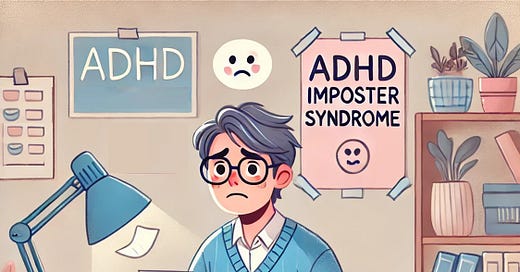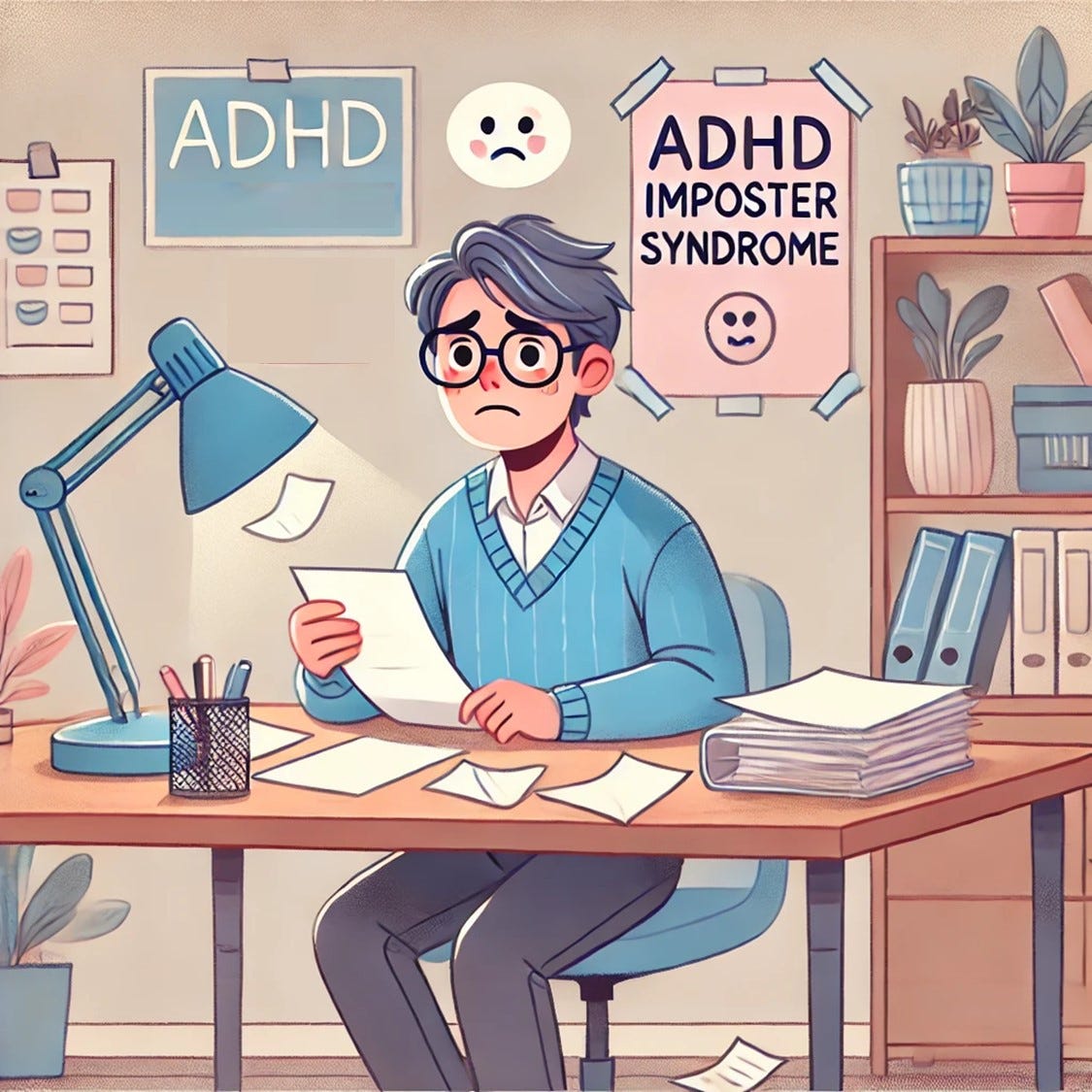🎭ADHD & Imposter Syndrome: How to Stop Feeling Like a Fraud at Work
🎭 Tired of Feeling Like a Fraud? Here’s How to Silence Self-Doubt & Thrive!
🎭 “I Don’t Belong Here.”
Maria just got promoted. Her boss congratulated her, her coworkers cheered and yet… she felt nothing but panic.
💭 “They made a mistake.”
💭 “I just got lucky.”
💭 “Soon, they’ll realize I have no idea what I’m doing.”
Maria had worked twice as hard as everyone else to compensate for her ADHD forgetfulness, procrastination and distractions.
But instead of feeling proud, she felt like a fraud.
🎭 This is Imposter Syndrome, and for those of us with ADHD, it can feel relentless.
But here’s the good news: You’re not actually a fraud. 🎭
Your 🧠 is just playing tricks on you.
👉 Let’s break it down and learn how to beat it.
🧠 What Is the ADHD Imposter Syndrome?
Imposter Syndrome is the persistent feeling that you’re not as competent as others think you are. It makes you believe your success is due to luck, not ability.
🛑 Even when you have proof of your skills - good feedback, achievements, years of experience - you still feel like a phony.
🚨 The ADHD Twist:
People with ADHD experience imposter syndrome more intensely because:
✅ We struggle with working memory, so we forget our past successes.
✅ We hyperfocus on mistakes instead of achievements.
✅ We have rejection sensitivity (RSD), making criticism feel 100x worse.
🔍 Sound familiar? Let’s dive in!
⚠️ When Does It Strike?
ADHD Imposter Syndrome can hit hardest when:
🔴 Starting a new job → “They’ll realize I have no idea what I’m doing.”
🔴 Getting praise → “They’re just being nice.”
🔴 Making a mistake → “See? I knew I wasn’t good enough.”
🔴 Comparing yourself to others → “Why can they do it, but I can’t?”
🌪️ Before you know it, you’re spiraling into self-doubt. But there’s a way out!
❓ Why Do You Need to Address It?
If left unchecked, the imposter syndrome can:
❌ Make you overwork to "prove yourself" → leads to burnout.
❌ Stop you from taking risks → you avoid new opportunities.
❌ Cause anxiety & stress → making work feel exhausting.
⚡ Breaking free from imposter syndrome can unlock
confidence, career growth and self-worth.
🔬 The Science Behind ADHD & Imposter Syndrome
🔹 ADHD & Low Dopamine: The ADHD brain has lower dopamine levels, making validation from others feel short-lived. (Mark. S, Gold, 2014)
🔹 Time Blindness & Memory Gaps: ADHD makes it hard to remember past achievements, so we feel like we’re constantly "starting over." (Barkley, 2010)
🔹 Overactive Amygdala & RSD: ADHD brains have a stronger fear response, making criticism feel like a personal attack. (Maarten Mennes, 2014)
💡 Translation? Your brain filters out your wins and magnifies self-doubt—but you can change that!
🎭 The Before & After: Escaping the Imposter Spiral
🔴 Before:
You get an award at work. Your brain whispers:
💭 “It was luck. Someone else deserved it.”
🔵 After Applying ADHD-Friendly Strategies:
You tell yourself:
✅ “I worked hard for this. My brain just doesn’t store wins well.”
✅ You write down your achievements to revisit later.
✅ You accept the praise instead of brushing it off.
🚀 The difference? You take control instead of letting imposter syndrome run the show!
🛠️ ADHD-Friendly Strategies to Overcome Imposter Syndrome
1️⃣ The Success Jar Method 🏆
Your ADHD brain forgets achievements. Keep a "Success Jar" (or a digital note) with:
✅ Wins, no matter how small!
✅ Positive feedback from coworkers.
✅ Screenshots of praise.
Revisit it when imposter syndrome hits.
2️⃣ Externalize the Proof 📜
Since ADHD brains struggle with memory, create a visual proof system:
✅ Keep an "Accomplishments Document."
✅ Ask trusted people to remind you of your strengths.
3️⃣ Name Your Imposter Voice 🎭
Give your imposter thoughts a funny name like “Doubt Goblin” or “Liar Larry.”
🗣️ When self-doubt creeps in, say: “Oh, it’s just Liar Larry again.”
🎯 This separates you from the negative thoughts and makes them easier to ignore.
4️⃣ Use the "If They Can, So Can I" Rule 🔄
Instead of comparing yourself negatively, tell yourself:
✅ "If they learned this, I can too."
✅ "If I was really faking, I wouldn't have gotten this far."
5️⃣ Act As If You Believe in Yourself 🎭
Even if you don’t feel confident, act like you do.
🤔 Ask yourself: "What would I do if I believed I belonged here?"
➡️ Then do that.
Confidence follows action, not the other way around.
🎯 Action Plan: Kick Imposter Syndrome to the Curb
✅ Step 1: Track Your Wins (Success Jar, Notion doc, or voice memos)
✅ Step 2: Challenge Imposter Thoughts (Would I say this to a friend?)
✅ Step 3: Get External Validation (Ask a trusted person for perspective)
✅ Step 4: Take Small Confident Actions (Fake it till you make it—seriously)
📌 Quick Cheat Sheet: ADHD vs. Imposter Syndrome Fixes
🚨 Imposter Thought → ✅ ADHD-Proof Fix
"I just got lucky" → Write down past wins 📜
"I don’t belong here" → List evidence that you do 🏆
"They’ll find out I’m a fraud" → Talk to a mentor for perspective 🗣️
"I’m not as smart as them" → Remember: effort beats talent 🔥
💡 Final Reminder: You didn’t "trick" your way into success. Your ADHD brain is just filtering out your achievements.
Trust your growth! 🚀
🔗 More Resources:
🔬 ADHD & Self-Doubt
🛠️ Notion – Digital Productivity Tool
💬 What About You?
🎯 Which strategy will you try first? Let me know in the comments!
🔥 Share this with someone who needs to hear it.
📩 Subscribe for ADHD-friendly productivity hacks!










